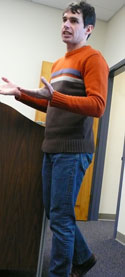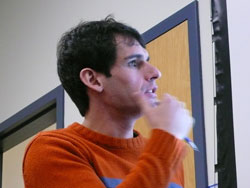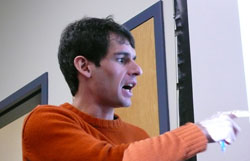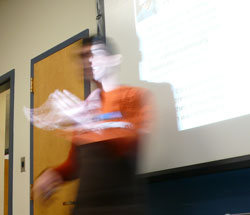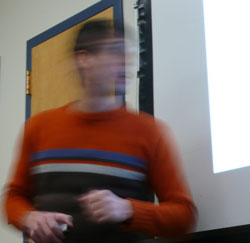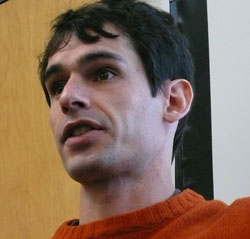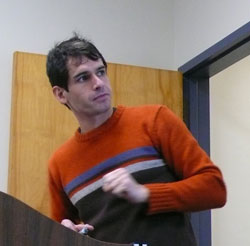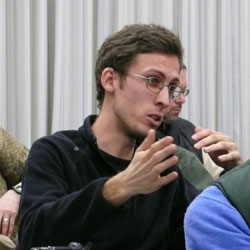

![]()
::: postdoc fellowships
::: senior fellowships
::: resident fellowships
::: associateships
![]()
being here
::: visiting
::: the last donut
::: photo album
::: center home >> being here >> last donut? >> 6 february 2007 |
Tuesday, 6 January 2007 At first the talk looks like a traditional piece of philosophy. How do we ascribe intentions of to others? How do moral judgments play a role in those ascriptions? The circumstance is familiar. An industrialist implements a new plan, knowing but indifferent to the fact that it will harm the environment. Most of us would say that the industrialist intentionally harmed the environment. But now imagine that the industrialist knew that the plan would help the environment, but was indifferent to it. We would likely say he did not intentionally help the environment. These judgments are so automatic and natural that there seems little more to say. Moral judgments of good and bad seem to be an essential part of our ascription of intentional actions to the industrialist. The only difference between the two plans is that we switched a morally good thing, help for the environment, with a morally bad one, harm for the environment. Yet that is all that was needed to flip our judgments of intentional action. There is a great deal more to say and Edouard begins to say it. There is a sense of excitement in his speech, as if he cannot tell us all the details quickly enough. He paces back and forth, gazing intently at as, speaking rapidly. We learn that giving philosophical treatments of these topics has changed over the years. The new literature to which Edouard contributes is not satisfied just to accept our hunches over what most people would say. It is an empirical question. You have to ask people what they would say in a properly controlled experiment. Edouard reports that Josh Knobe had done just that, with all due statistical diligence, and things worked out quite as we expected. Here is where Edouard begins his complaints. The energy of his delivery seems to increase, if that is possible. His voice is now loud enough for me to wonder if our small room could sustain an echo. He is a moving blur. It is true that moral judgments are tied up with our ascriptions of intentional actions in these cases. But are they an essential part of those ascriptions so that they couldn't be done without them? Or are the moral judgments merely accidental parts of the process? Edouard's goal is to establish that we have no way of ruling out that second accidental course. He starts to make his case and it gets complicated. For the moral judgments to be an essential part of the ascription, we need a decent understanding of just what is essential to the possessing of a concept, such as the ascription of an intention. How must that concept be configured so that the appearance of moral judgments in it is essential to it, and not just an accident? A careful review of the philosophical literature on concepts reveals such a spread of accounts that no definite verdict is possible. We have become paupers. We thought we were rich in reasons and understanding. Edouard has shown us it was all an illusion. He now begins to restore our wealth with a new account of the ascription of intentions that require no moral dimensions. We are, his account says, likely to attribute intentional action towards a secondary consequence that imposes a cost on us, but not if there is no cost. If the larger smoothie happens to come with a free commemorative mug the drinker doesn't care about, then we say the drinker didn't intentionally choose it in buying the smoothie. However, if the large smoothie happens to cost a dollar more, we'd say the drinker did intentionally choose to pay the extra dollar. The difference is just that one is a cost and the other not. And Edouard checked all this empirically by surveying his undergraduates. They agree; or at least they agree as well as statistical analysis can tell. We say the industrialist intentionally chose to harm the environment. Why, Edouard wonders, isn't this just another case of our attributing intentional action when there is a cost, harm to the environment? Well--why? The question immediately sends us off into imaginings of a thousand and one other scenarios. Everyone of the many stories Edouard laid out can be varied in this or that detail; and every variant conjures up more questions and possibilities. And I could sense a roomful of people eager to try out their variants.
John D. Norton Edouard Machery |
